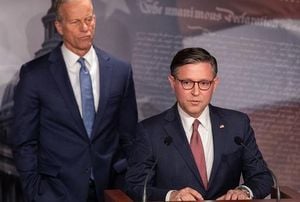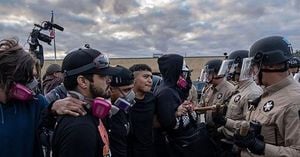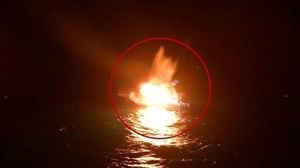On Sunday, September 28, 2025, Moldova found itself at a historic crossroads as voters headed to the polls in a parliamentary election that was as much about the country’s future geopolitical orientation as it was about local governance. The stakes, as described by President Maia Sandu, were nothing short of existential: would Moldova consolidate its democracy and continue toward European Union membership, or would it be pulled back toward Moscow’s orbit—a scenario many in the country’s leadership and the EU accused Russia of working hard to engineer?
Polling stations opened at 7:00 am local time and closed at 9:00 pm, with results expected later the same day. Moldova, a small nation of 2.4 million wedged between Ukraine and Romania, is one of Europe’s poorest countries and has long been split over whether to deepen ties with Brussels or maintain its Soviet-era relationship with Moscow. This division was on full display throughout the campaign, which saw extraordinary tension and accusations flying from all sides.
By the time more than 96 percent of the votes were counted, the pro-EU Party of Action and Solidarity (PAS)—in power since 2021—had claimed victory, leading the pro-Russian Patriotic Bloc with 48.9 percent to 25.02 percent. The Alternative Bloc, also accused of being pro-Russian, finished a distant third with around 8-9 percent of the vote. According to early projections by RFE/RL, PAS was expected to win at least 51 seats in the 101-member parliament, just enough for a majority. The Patriotic Bloc was projected to secure 29 seats, with three smaller parties possibly taking between six and nine seats each. However, it remained uncertain whether PAS would govern alone or need coalition partners.
The campaign was marked by what officials described as an “unprecedented campaign of disinformation” from Russia, a charge echoed by the European Union. Prime Minister Dorin Recean described the situation as a “siege on our country,” blaming the Kremlin for spending hundreds of millions of euros in “dirty money” to interfere in the campaign. The government and its allies were adamant: Moldova’s democratic path and European future were under threat.
President Sandu, whose PAS party was at the center of the pro-European push, called the vote Moldova’s “most consequential election.” On Friday before the polls, she warned on X, “Its outcome will decide whether we consolidate our democracy and join the EU, or whether Russia drags us back into a grey zone, making us a regional risk.”
Moscow, for its part, flatly denied all allegations of waging an online disinformation campaign, buying votes, or stirring unrest. Instead, Russian officials accused European leaders of interfering in Moldova’s internal affairs. The tension was palpable on August 27, Moldova’s Independence Day, when French President Emmanuel Macron, German Chancellor Friedrich Merz, and Polish Prime Minister Donald Tusk traveled to Chișinău to rally support for Sandu’s party. Macron denounced Kremlin “lies and propaganda,” while Merz pledged European support for reforms and promised to send German experts to assist Moldova on its EU accession path.
The campaign’s intensity was matched by action on the ground. In the week leading up to the vote, Moldovan authorities conducted hundreds of searches related to “electoral corruption” and “destabilisation attempts,” making dozens of arrests. On September 22, for example, authorities carried out 250 raids and detained over 70 individuals allegedly linked to a Russia-backed plan to incite mass riots and destabilize the country. Just two days before the election, officials barred 36 candidates from the Heart of Moldova party, part of the Patriotic Bloc alliance, citing illegal financing. Party leader Irina Vlah was sanctioned by several EU member states for suspected Russian interference. The opposition slammed these decisions as undemocratic and accused the ruling party of trying to tilt the playing field.
Voters, meanwhile, expressed a mix of hope and frustration. While many, like Olga—a pensioner who returned from abroad to cast her ballot—voiced strong support for the European path, others worried about economic hardship and the loss of traditional values. “We must strive to serve the interests of Moldovans... We must preserve our identity, our freedom, and our family traditions,” said Tudor Soilita, a 33-year-old blogger at a rally for the Patriotic Bloc, as reported by AFP.
Turnout stood at around 52 percent—two points lower than the 2024 presidential run-off but four points higher than in the 2021 parliamentary elections. Analysts noted that turnout from the diaspora, who tend to favor PAS, and from the breakaway region of Transnistria, which leans pro-Russian, would be decisive. However, authorities blocked one of the main bridges linking Transnistria to Moldova due to an alleged “threat,” and closed several other crossings for construction, leading to long queues and searches for voters crossing by car.
The aftermath of the vote was just as charged. Leaders of the Patriotic Bloc announced a protest in front of the Central Electoral Commission building in Chișinău, claiming victory and demanding that “no fraud be committed in the final tallying of the election results.” Former president Igor Dodon of the Socialists, a leading figure in the pro-Russian opposition, said he was “convinced the opposition will have a majority,” and accused the PAS government of running a “dictatorial regime which under the EU cover violates democratic norms.” Dodon also charged “the West” with interference and warned of post-election instability.
Adding to the intrigue, Telegram CEO Pavel Durov accused French intelligence of pressuring him to censor Telegram channels accused of spreading Russian disinformation, alleging that political motivations were behind content removal requests. Durov wrote, “Telegram is committed to freedom of speech and will not remove content for political reasons,” and claimed he was offered leniency in legal proceedings in France in exchange for cooperation.
With about 20 political parties and independent candidates competing for the 101 parliamentary seats, the path ahead remains uncertain. As analyst Igor Botan told AFP, “Post-election negotiations to form an alliance (to govern) are highly likely, and here too, things are unclear.” The result, he said, is “very difficult to predict.”
For now, as Moldova’s political class gears up for what will likely be protracted coalition talks, the country’s citizens and its European neighbors are watching closely. The question of whether Moldova’s future lies with Brussels or Moscow remains unsettled, but one thing is clear: the battle for Moldova’s soul is far from over.



